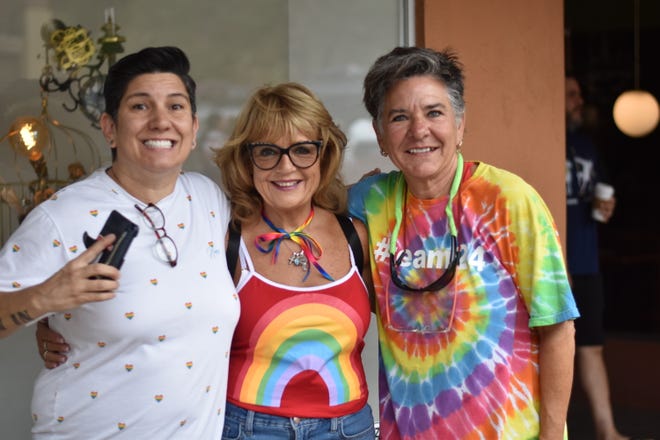In one of Arizona’s most famous small towns, where cowboys and hippies coexist, official pride celebrations have returned to Bisbee after a two-year hiatus due to COVID-19 restrictions.
In 2020, the event took place virtually, and last year, the organizer, Bisbee Pride Inc., a nonprofit organization, could not obtain the necessary permits. Instead, the organizers worked with local businesses to host vendors and alternative events.
“Everybody was spread out, so there wasn’t a lot of togetherness,” said Liz Hosler, 50, who is originally from Bisbee but is visiting from Phoenix for the event. This year, Hosler said it feels amazing to celebrate Pride in Bisbee again.
“Everybody is smiling … everybody is just doing their deal,” she said.
This year is Bisbee Pride’s 18th year of celebrating the LGBTQ community.
The four-day event has a variety of activities, shows and parties, including a drag show, a parade, a street dance party and more.
Early Saturday morning before festivities began, a few tourists were meandering around Bisbee’s quiet and quaint streets.
One of them was Antonio Vasquez, who drove down from Phoenix for the weekend.
“I heard Pride was a lot of fun here,” said Vasquez, who came to celebrate Pride with his family and to experience a change of scenery. “It’s quaint and cute, it’s just a whole different vibe.”
Doug Morgan also drove from Phoenix for Bisbee Pride, bringing his husband, Ronnie Lamboso, to celebrate Lamboso’s first-ever Pride celebration.
Morgan said that while the existence of a Pride event in rural Arizona feels normal nowadays, 25 years ago, he would never have dreamed of celebrating Pride in a town like Bisbee.
To Morgan, Pride celebrations mean “respect, freedom, it means everything,” he said. “That’s the nice thing about Pride. People aren’t being judged. It’s very open. Every gay Pride is open.”
How did a traditionally conservative mining town become so accepting?
Ramon Garcia, president and CEO of Bisbee Pride Inc., said the town changed after the mines closed down. According to Queen Mine Tours, the mines closed down in 1975.
“A lot of people left Bisbee to follow mining trends and business wherever they could. That left a lot of vacancies,” he said. “It cut down the population of Bisbee horribly.”
Garcia said that artists, hippies and others attracted by the area’s affordable and plentiful real estate began moving into town.
“The artist communities tended to be more liberal, open and accepting,” said Garcia, adding that he never experienced discrimination growing up in Bisbee.
Bisbee has made national headlines for its support of LGBTQ. In 2013, the town became the first Arizona city to legalize civil unions for same-sex couples.
Although Garcia joined Bisbee Pride eight years ago, the movement actually began in 2004 when a group of friends decided to throw a picnic. Since then, it has flourished into a long-lasting celebration of the LGBTQI+ movement.
Garcia said that Pride has not only helped the gay community, but it has also helped businesses during a particularly slow tourist month.
“We wanted to keep business coming in and this economic shot in the arm during a very slow period in our tourism economy,” Garcia said.
During a typical year, the event draws 3,000 to 6,000 people, Garcia said, adding that this year the event has attracted double the number of vendors compared with a typical year.
Kerri Clark, 60, and her family sat on her truck bed parked along Main Street, waiting for the Pride parade to begin. She had been visiting Bisbee for years before becoming a resident.
She said it was the diversity and acceptance that attracted her to Bisbee.
The essence of Bisbee is summed up in one sentence her grandson often says.
“He says, ‘I can put on my hat, my jacket and my funky shoes and nobody cares here,'” Clark said. “They just accept you. This is who you are. That’s what we love about here.”
Reach Report for America reporter Sarah Lapidus at sarah.lapidus@gannett.com. Follow Sarah Lapidus on twitter @lapidus_sarah.








